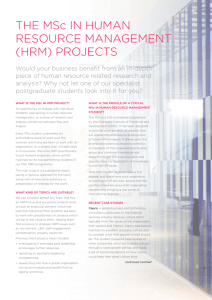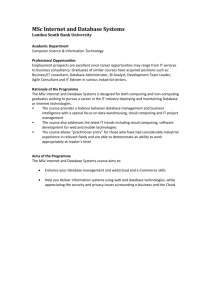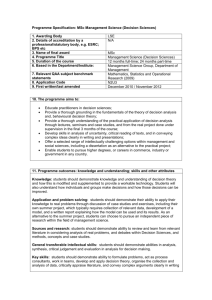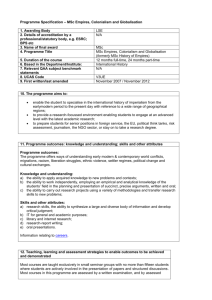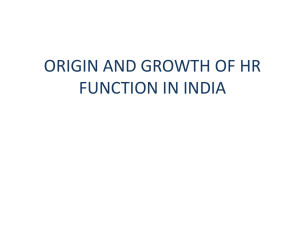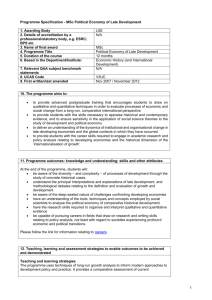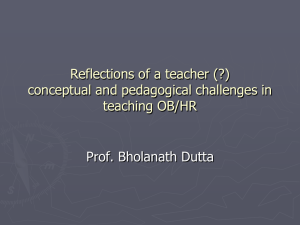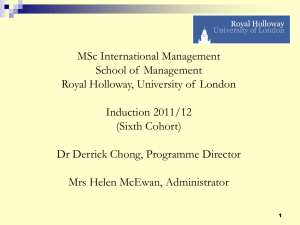MSc International Employment Relations and Human Resource
advertisement
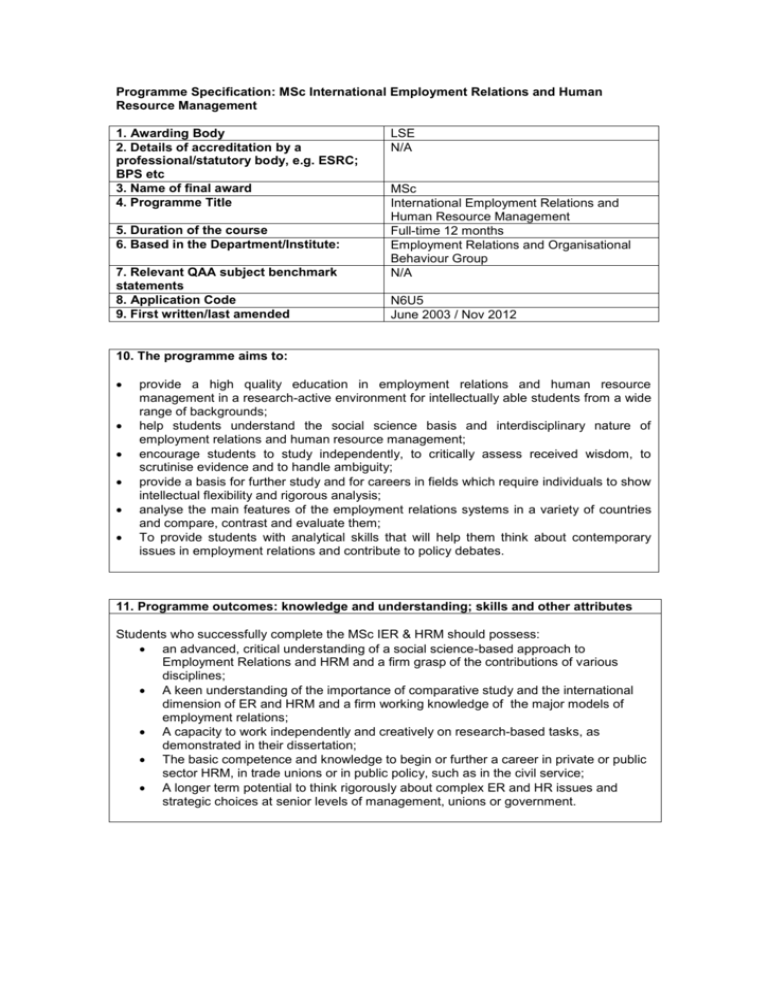
Programme Specification: MSc International Employment Relations and Human Resource Management 1. Awarding Body 2. Details of accreditation by a professional/statutory body, e.g. ESRC; BPS etc 3. Name of final award 4. Programme Title 5. Duration of the course 6. Based in the Department/Institute: 7. Relevant QAA subject benchmark statements 8. Application Code 9. First written/last amended LSE N/A MSc International Employment Relations and Human Resource Management Full-time 12 months Employment Relations and Organisational Behaviour Group N/A N6U5 June 2003 / Nov 2012 10. The programme aims to: provide a high quality education in employment relations and human resource management in a research-active environment for intellectually able students from a wide range of backgrounds; help students understand the social science basis and interdisciplinary nature of employment relations and human resource management; encourage students to study independently, to critically assess received wisdom, to scrutinise evidence and to handle ambiguity; provide a basis for further study and for careers in fields which require individuals to show intellectual flexibility and rigorous analysis; analyse the main features of the employment relations systems in a variety of countries and compare, contrast and evaluate them; To provide students with analytical skills that will help them think about contemporary issues in employment relations and contribute to policy debates. 11. Programme outcomes: knowledge and understanding; skills and other attributes Students who successfully complete the MSc IER & HRM should possess: an advanced, critical understanding of a social science-based approach to Employment Relations and HRM and a firm grasp of the contributions of various disciplines; A keen understanding of the importance of comparative study and the international dimension of ER and HRM and a firm working knowledge of the major models of employment relations; A capacity to work independently and creatively on research-based tasks, as demonstrated in their dissertation; The basic competence and knowledge to begin or further a career in private or public sector HRM, in trade unions or in public policy, such as in the civil service; A longer term potential to think rigorously about complex ER and HR issues and strategic choices at senior levels of management, unions or government. 12. Teaching, learning and assessment strategies to enable outcomes to be achieved and demonstrated Teaching and learning strategies: Larger courses are taught by lecture and class, supplemented by individual tutorials where necessary. Students are required to make class presentations regularly, usually as part of a syndicate. They are encouraged to think of learning as a collaborative process and teamwork is welcomed. Extensive notes as well as seminars are provided on the techniques of essaywriting, and coaching is also given in exam technique. Assessment strategies: Some courses are assessed by coursework (2000-word essays) and examination, whereas others are assessed by examination alone. For diagnostic purposes, both practice essays and mock exams are used. The Dissertation represents a quarter of the degree and is supervised by a member of the academic staff; however, students are expected to work independently in developing their own research question and method. An extensive project methods course is provided to give guidance. 13. Programme structures and requirements, levels, modules and awards For further information see the MSc International Employment Relations and Human Resource Management. Additional information 14. Criteria for admission to the programme Students will normally need a first class or upper second class honours degree or its overseas equivalent to be accepted onto the MSc. In exceptional cases, where candidates lack the required academic attainments, the School takes relevant work experience into account. It is strongly recommended that all graduates of non-UK institutions submit a GRE or GMAT score. Experience in Employment Relations or Human Resource Management is an advantage but not essential. The programme is academically demanding and students are expected to be inquisitive and thoughtful, to have good writing skills, and be willing to grapple with research methods. Even so, a social science degree is not a prerequisite. 15. Indicators of quality Growing demand from well qualified applicants from around the world. Intense competition for places; Favourable remarks by external examiners and consistently good examination results; Student feedback; Employer evaluation of and demand for MSc IER&HRM graduates; The Industrial Relations Department (now the Employment Relations and Organisational Behaviour Group) obtained full marks (24/24) in the QAA teaching assessment exercise in February 2001; The Department was highly ranked in the last RAE; The Department has made a number of new appointments at the top of their respective fields; The LSE Careers Centre website provides data on career destinations of LSE graduates. 16. Methods for evaluating and improving the quality and standard of teaching and learning The TQARO student questionnaire, which is used as a tool to diagnose problems and explore improvements; Staff-Student Committee on which the MSc IER & HRM has designated representation and whose concerns are always prominent on the agenda; Teaching teams on each course – who meet regularly to evaluate past performance, remedy defects and propose improvements; Staff meetings in which the problems of teaching and student service are routinely discussed; External examiners, who pay particular attention to the MSc IER&HRM projects; The Teaching and Learning Centre is available to monitor and observe teaching and offers constructive advice on how to improve the standard of teaching and quality; The Teaching Learning and Assessment Committee which regulates all aspects of teaching quality; Full departmental TLAC review every five years; The Graduate Studies Sub-Committee which oversees all graduate programmes and ensures that significant changes to programmes and courses pass through a sequence of formal stages, so that curricular changes are appropriate and compatible with other developments.

